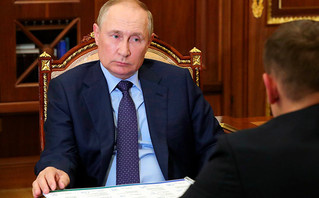China now sees Vladimir Putin with a different eye after the brief episode mutiny of Wagner mercenaries. The events reinforced the belief that Russia, its strategic partner in countering Western influence, is not as stable as Beijing would hope, analysts say.
Beijing, disturbed by her invasion of Russia in Ukraine in February 2022, but maintains its diplomatic and economic support for Moscow, which is hit by Western economic sanctions and isolated on the international stage.
In this context, the Chinese president Xi Jinping visited Moscow in March, where he declared in front of his Russian counterpart Vladimir Putin that bilateral relations were “entering a new era”.
After the brief mutiny by Wagner’s private Russian army mercenaries, Beijing responded yesterday by assuring Russia that it supported Russia in “protecting the stability” of the country against a stance which Beijing said was an “internal matter ” of Russia.
According to analysts, Beijing chose to take a wait-and-see attitude towards these events as it understood that Wagner’s mutiny was exposing the cracks in its power. Vladimir Putin.
“China has already been surprised by the poor performance of the Russian military in Ukraine,” says Susan Thornton, a US diplomat and former undersecretary for East Asia and the Pacific in Donald Trump’s administration.
“This episode will likely be seen as another sign of weakness“, he says, as reported by the Athens News Agency.
How Putin’s image has changed

The Chinese leadership has long viewed Russia as a useful and reliable partner in its effort to build a front that will act as a counterweight to Western influence on the international stage.
Before the Wagner mutiny, China “probably had no doubt that Putin is the undisputed leader of Russia,” says Victor Shih, an expert on Chinese politics at the University of San Diego.
However, after such a “blatant” questioning of the power of the Kremlin’s master, Beijing will “henceforth seriously examine the power dynamics in Russia”, he emphasizes.
China is Russia’s top economic partner, with bilateral trade reaching a record $190 billion (174 billion euros) last year, according to Chinese customs data.
And China almost doubled its imports of Russian oil in May compared to February 2022, according to the same source.
Beijing presents itself as neutral against the Russian invasion. It calls for respect for the sovereignty of all countries, including Ukraine, it has been implied, but has never publicly condemned Putin’s invasion, prompting criticism from Kiev’s Western allies.

“Shock for Beijing to see Russia’s internal defense mechanisms tested”
“This was probably a shock for Beijing, and especially for Xi Jinping, to see Russia’s internal defense mechanisms being tested,” said Björn Alexander Duben, an expert on Sino-Russian relations at China’s Jilin University. And it is certain that the Chinese leadership “will want to learn lessons.”
Beijing often views episodes of destabilization that roil its neighbor with concern.
The Chinese leadership often cites the fall of the Soviet Union and the instability that followed as an example to avoid. which justify the exercise of power with a fist.
“China is used to dramatic changes in Russia, even if they are not necessarily to its liking,” notes Yu Bin, a professor at the University of Wittenberg in Germany.
Some believe Wagner’s stance may prompt Beijing to step up mediation efforts to end war in Ukrainein order to avoid further weakening of Russia.
But the main thing is that “recent events will likely lead China to underestimate its perception of Russian state power and Russia’s political stability,” says Victor Shih of the University of San Diego. “It is a clear indication that the invasion of Ukraine is fundamentally shaking the stability of Russia.”
Source: News Beast
With 6 years of experience, I bring to the table captivating and informative writing in the world news category. My expertise covers a range of industries, including tourism, technology, forex and stocks. From brief social media posts to in-depth articles, I am dedicated to creating compelling content for various platforms.







